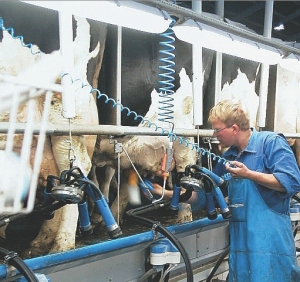Presentations highlighted the need to better recognise and manage mental well-being issues in rural businesses. While many situations reflect the make-up of the individuals affected, there remain some important strategies that can mitigate these risks to the well-being in any business.
Stress can arise for various reasons in modern farming operations.
It is obvious that every business will occasionally face external risks from climate, biosecurity incursions, fluctuating markets or other economic factors such as interest rates, exchange rates and commodity prices. These external events can be indiscriminate in their timing, location and impact on production and profitability. While their causes are difficult to control it is still possible to proactively manage the response to them. The key ingredient for this is ensuring realistic perspective and proactive strategies for a positive mindset.
Internal risks tend to result more from strategic choices which are more controllable. The most common are either financial pressures arising from unsustainable debt levels or the negative impact of breakdowns in relationships with staff or family. Effective management of these depends heavily on the capabilities of business leaders and their commitment to best practice.
Farmer responses can magnify the impact of stress. Some respond with an unrelenting determination to overcome adversity by increasing their effort and workload. This can lead to unsustainable work / life balance and a consequent pessimistic mindset from lack of perspective. I have seen this contribute to relationship breakdown between couples or families as the resulting tension causes inability to separate work from family time.
Stress and its negative impact on mental health is often heightened by the “do-it-yourself” approach of many in the rural sector. The staunch, self-reliant style of many farmers can be made worse by isolation as partners increasingly work off farm. It is also impacted by farmers’ reluctance to discuss how they are coping or to ask for help.
There is considerable work to do at an industry level to encourage rural males to better manage this area. In my view, a key message must be that it’s OK for farmers to ask for help when they are not OK.
The work I do with my clients to help them and their staff understand how they are “wired” offers me a valuable entry point to engage in such discussions. Team and individual discussions about personality styles and their impact on leadership style, work style and general outlook offer fertile ground for a wider discussion about mental health and well-being.
Like any aspect of staff performance and relationship management, a review of wellbeing should be adopted as a routine discussion rather than something that is only considered when a problem emerges. Like fertiliser on pastures or machinery maintenance, regular “check ins” on mental health will ensure reviews are even more meaningful and rewarding. Most importantly they will enable early intervention and engagement of specialist help if required.
A key learning in this area for me has been that we all need to acknowledge and accept our weaknesses if we are to achieve our potential. Breaking down barriers and promoting conversations that remove the stigma of mental health must be a priority task if New Zealand farmers wish to remain world leaders in sustainable farming.
• Kerry Ryan is a Tauranga based agribusiness consultant. Contact him at www.kerryryan.co.nz
















